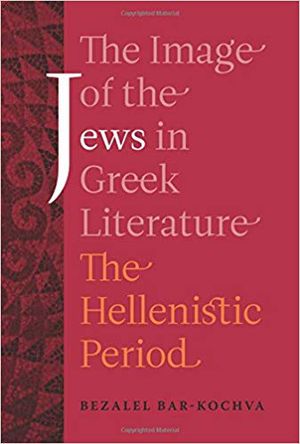The Image of the Jews in Greek Literature: The Hellenistic Period (2010 Bar-Kochva), book
The Image of the Jews in Greek Literature: The Hellenistic Period (2010) is a book by Michael F. Bird.
Abstract
"This landmark contribution to ongoing debates about perceptions of the Jews in antiquity examines the attitudes of Greek writers of the Hellenistic period toward the Jewish people. Among the leading Greek intellectuals who devoted special attention to the Jews were Theophrastus (the successor of Aristotle), Hecataeus of Abdera (the father of "scientific" ethnography), and Apollonius Molon (probably the greatest rhetorician of the Hellenistic world). Bezalel Bar-Kochva examines the references of these writers and others to the Jews in light of their literary output and personal background; their religious, social, and political views; their literary and stylistic methods; ethnographic stereotypes current at the time; and more."--Publisher description.
Editions
Published in Berkeley, CA: University of California Press, 2010.
Contents
Introduction -- Part I. From Alexander and the Successors to the Religious Persecutions of Antiochus Epiphanes (333-168 B.C.E.) -- Theophrastus on Jewish Sacrificial Practices and the Jews as a Community of Philosophers -- Aristotle, the Learned Jew, and the Indian Kalanoi in Clearchus -- The Jewish Ethnography by Hecataeus of Abdera -- Megasthenes on the "Physics" of the Greeks, Brahmans and the Jews -- Hermippus of Smyrna on Pythagoras, the Jews, and the Thracian -- The Diachronic Libels and Accusations (A): Mnaseas of Patara and the Origins and Developments of the Ass Libel -- Part II. The Hasmonaean Period: From the Jewish Revolt to the Roman Conquest (167-63 B.C.E.) -- The Diachronic Libels and Accusations (B): The Seleucid Court Historian and the Blood Libel -- Agatharchides of Cnidus on the Sabbath as a Superstition -- The Diachronic Libels and Accusations (C): Lysimachus of Alexandria and the Egyptian Hostile Accounts of the Exodus -- Posidonius of Apamea (A): The Man and his Writings -- Posidonius of Apamea (B): The Jewish Ethnography in Strabo's Geographica; Mosaic Judaism versus Second Temple Judaism -- Posidonius of Apamea (C): Josephus on the Siege of Jerusalem by Antiochus VII Sidetes (132/1 B.C.E.); Antiochus the Pious and Hyrcanus the Tyrant -- Posidonius of Apamea (D): The Anti-Jewish Libels and Accusations in Diodorus and Apion -- The Geographical Description of Jerusalem by Timochares. the Siege, and the Libels -- The Anti-Jewish Ethnographic Treatise by Apollonius Molon -- Conclusion -- Appendix: The God of Moses in Strabo / Ivor Ludlam.
External links
- [ Google Books]
